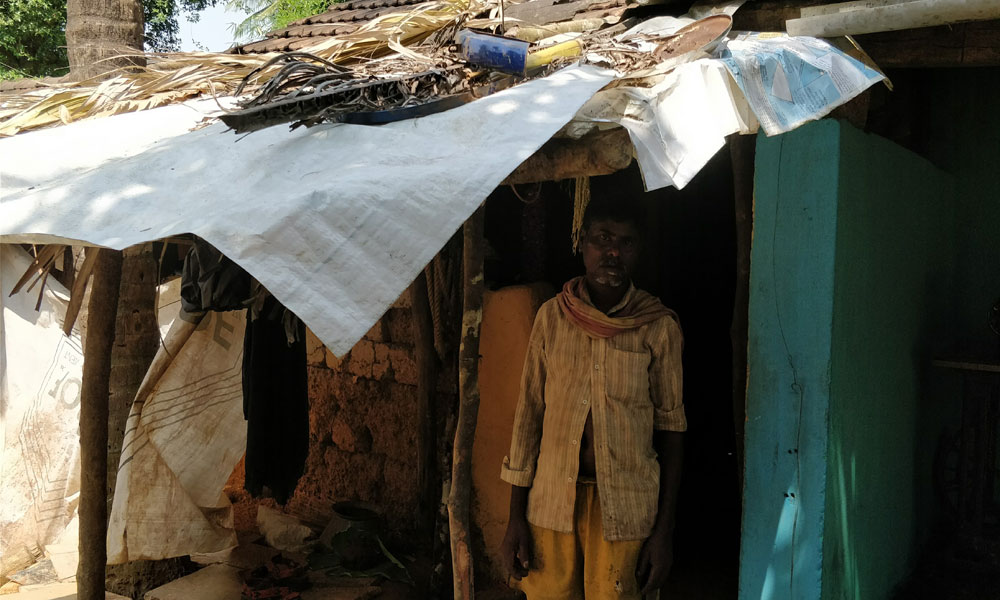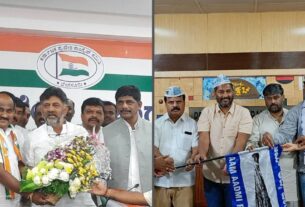Caste discrimination is a major roadblock in the way of government services reaching the SC/ST community in Siddapur Taluk, Karnataka.
Bangalore, April, 8, 2018: People belonging to the Scheduled Caste (SC) and Scheduled Tribe (ST) communities in Siddapur Taluk, Karnataka say they are denied access to housing and LPG schemes due to caste discrimination that continues to this day.
The people from the community are living in structures that are decades old and could cave in any day. “Just have a look inside the house. The house I live in is more than 30 years old. Everything is falling apart. My family will be crushed in the event of a cave-in,” said Balachandra Rama, a farmhand in Doddamane, Siddapur.
There are many schemes in Karnataka to provide housing to people who can’t afford it. Some are centrally sponsored such as Indira Awaas Yojana and Rajiv Awas Yojana. Some are state sponsored such as the Ashraya schemes, Basava Housing Scheme, and Ambedkar Housing Scheme. Indira Awaas Yojana provides housing to the homeless and to those living in dilapidated or kaccha (made out of mud) houses in rural areas. This scheme is supposed to provide assistance for the construction of a new house, upgrades from kachha houses, and provide house sites, with the cost shared between the centre and the states.
However, Siddapur Taluk’s SC/ST people say they cannot avail these schemes due to caste discrimination. “They’re not ready to give us a proper house. The site is ours. This area was occupied by migrants like us from nearby areas decades ago. There are upper caste people living all around us who claim the whole area belongs to them. They want us to leave because we’re SC/ST. The fact that we don’t have ownership records that the Panchayat recognizes is working against us,” said Balachandra Rama.
The community lives in tiny kachha houses that don’t have toilets. They cannot add a toilet as trying to expand the house to any extent attracts dispute from the “upper-caste people” living in the region. “They (upper-caste people) ask us to leave but we have nowhere to go. So, we have to make do with the little space we have. No room for a toilet even,” said Indira Balachander, a farmhand in Siddapur Taluk.
“Our family, going back to my father-in-law, has been living here for 90 years now. Can’t even build a toilet. The “upper-caste people” occupy the whole hill. Water logs in the front yard, and we’ve been able to do nothing all this time,” said Devi Rama, another member of the SC/ST community.
Apart from housing, the SC/ST community in the region claims they don’t get access to LPG due to caste discrimination. “They say we’re SC/ST and deny us a gas connection. We don’t get gas. They threaten us that they won’t give us coupons for rations if we ask for gas. It would also cut into the kerosene we are entitled to get.” said Indira Balachander. “We’re forced to use firewood which produces a lot of smoke.”
The use of smokeless chulhas such as Astra Ole can make life easier. However, the taluk administration has discontinued its awareness program on smokeless chulhas.
“Right now we don’t have any scheme or initiative to promote Astra Ole. We did have a training programme many years ago. But, since then and right now we don’t have any programme in place,” said Kamakshi Naik, Panchayat Development Officer, Taluk Panchayat, Siddapur
Not having an LPG connection makes life difficult as one has to lug firewood from forest areas one to two kilometers away. “We get firewood from the forest, one and a half kilometers away. It is hard, but what can we do,” said Shashikala and Hanumanthappa Asthlar, an SC/ST couple who work as daily-wage laborers in the area.
“We don’t get gas either. Using kerosene and firewood is harder, but what can we do. If we ask for gas they deny us ration,” said Ganapati Maraiya a daily-wage laborer and a member of the SC/ST community in the region.
Despite the discrimination, the SC/ST people in the taluk are forced to work in the houses of the “upper-caste people” during certain times of the year. “We’re daily wage labourers and there’s little labour work around here. There’s some work during the areca nut season. Rest of the time we have to go work in the houses of upper-caste people in the neighborhood”, said Indira Balachander.



